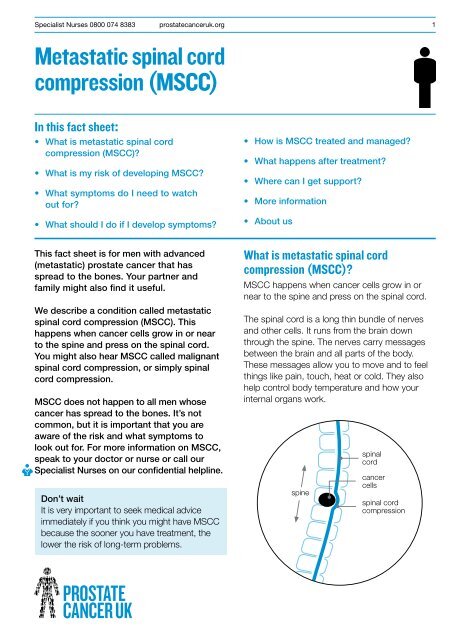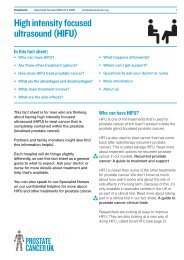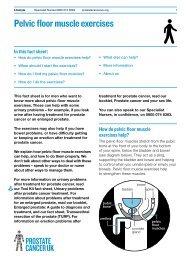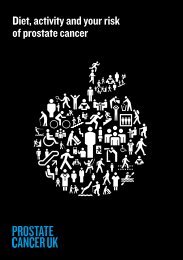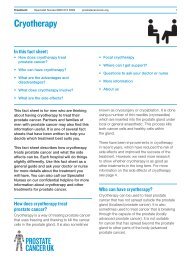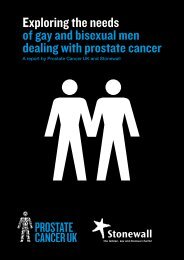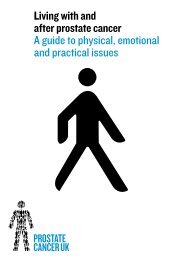Metastatic spinal cord compression (MSCC) - Prostate Cancer Charity
Metastatic spinal cord compression (MSCC) - Prostate Cancer Charity
Metastatic spinal cord compression (MSCC) - Prostate Cancer Charity
Create successful ePaper yourself
Turn your PDF publications into a flip-book with our unique Google optimized e-Paper software.
Specialist Nurses 0800 074 8383prostatecanceruk.org1<strong>Metastatic</strong> <strong>spinal</strong> <strong>cord</strong><strong>compression</strong> (<strong>MSCC</strong>)In this fact sheet:• What is metastatic <strong>spinal</strong> <strong>cord</strong><strong>compression</strong> (<strong>MSCC</strong>)?• What is my risk of developing <strong>MSCC</strong>?• What symptoms do I need to watchout for?• What should I do if I develop symptoms?• How is <strong>MSCC</strong> treated and managed?• What happens after treatment?• Where can I get support?• More information• About usThis fact sheet is for men with advanced(metastatic) prostate cancer that hasspread to the bones. Your partner andfamily might also find it useful.We describe a condition called metastatic<strong>spinal</strong> <strong>cord</strong> <strong>compression</strong> (<strong>MSCC</strong>). Thishappens when cancer cells grow in or nearto the spine and press on the <strong>spinal</strong> <strong>cord</strong>.You might also hear <strong>MSCC</strong> called malignant<strong>spinal</strong> <strong>cord</strong> <strong>compression</strong>, or simply <strong>spinal</strong><strong>cord</strong> <strong>compression</strong>.<strong>MSCC</strong> does not happen to all men whosecancer has spread to the bones. It’s notcommon, but it is important that you areaware of the risk and what symptoms tolook out for. For more information on <strong>MSCC</strong>,speak to your doctor or nurse or call ourSpecialist Nurses on our confidential helpline.Don’t waitIt is very important to seek medical adviceimmediately if you think you might have <strong>MSCC</strong>because the sooner you have treatment, thelower the risk of long-term problems.What is metastatic <strong>spinal</strong> <strong>cord</strong><strong>compression</strong> (<strong>MSCC</strong>)?<strong>MSCC</strong> happens when cancer cells grow in ornear to the spine and press on the <strong>spinal</strong> <strong>cord</strong>.The <strong>spinal</strong> <strong>cord</strong> is a long thin bundle of nervesand other cells. It runs from the brain downthrough the spine. The nerves carry messagesbetween the brain and all parts of the body.These messages allow you to move and to feelthings like pain, touch, heat or cold. They alsohelp control body temperature and how yourinternal organs work.spine<strong>spinal</strong><strong>cord</strong>cancercells<strong>spinal</strong> <strong>cord</strong><strong>compression</strong>
Specialist Nurses 0800 074 8383 prostatecanceruk.org 4There are several treatments available and youare likely to have a combination of these.• RadiotherapyThe aim of this treatment is to shrink thecancer cells that are pressing on your <strong>spinal</strong><strong>cord</strong>. It can also help to relieve the pain.Radiation is directed at the affected areafrom outside the body (known as externalbeam radiotherapy). The number of timesyou need treatment varies, but is likely tobe every day for up to a week. Read morein our Tool Kit fact sheet, Radiotherapyfor advanced prostate cancer.• SurgerySurgery is sometimes used. Your doctor willdiscuss this with you if it’s suitable for you.It usually involves reducing the pressure onyour <strong>spinal</strong> <strong>cord</strong> and supporting your spine.Surgery is usually done at a specialist <strong>spinal</strong>unit. You might be given radiotherapy onceyou’ve recovered from surgery, to shrinkany areas of cancer which might be leftin the spine.• A support braceThis fits around your back or neck and helpskeep your spine still. It can also help withpain. This is only used if other treatments arenot suitable for you, or if your spine still needssupport after other treatments.What happens after treatment?<strong>MSCC</strong> can affect men in different ways. Gettingtreatment early can reduce the risk of long-termproblems, but for some men it can take weeksor months to recover. Sometimes the effects canlast longer. Your doctor or nurse at the hospitalwill make sure you get the support you need.If <strong>MSCC</strong> means that you’re less able to walkand move around, a physiotherapist can showyou exercises which can help. An occupationaltherapist (OT) can make sure you have theright equipment in your house so that you’recomfortable and can move about more easily.Your doctor will also look at the treatments youare having for your prostate cancer.You can read about treatments which may beused to help control the growth of prostatecancer in our Tool Kit fact sheet, Second-linehormone therapy and further treatmentoptions. There are also treatments whichmight help with symptoms. Read about thisin our booklet, Advanced prostate cancer:Managing symptoms and getting support.Where can I get support?Talking to professionalsIf you have been diagnosed with <strong>MSCC</strong>,there is support available. Your doctor or nurseshould be able to answer any questions orconcerns you might have, as well as providesupport. You and those close to you can alsospeak to one of our Specialist Nurses by callingour confidential helpline. They can help you tounderstand your diagnosis, treatment optionsand the emotional effects of cancer.You might also find it helpful to talk to acounsellor to help you to deal with yourfeelings. You may be able to get a referralto a counsellor through your GP or hospitaldoctor or nurse, or you can get a list of privatecounsellors from the British Association forCounselling & Psychotherapy (BACP)(see page 5 for contact details).Talking to someone who’s been thereYou and your family might find that talkingto someone with similar experiences helps.Our support volunteers are all personallyaffected by prostate cancer, including advancedprostate cancer, and are trained to listen andoffer support over the telephone. They includemen with prostate cancer, their partners andother family members. Call our SpecialistNurses on our confidential helpline to arrangeto speak to a volunteer.
Specialist Nurses 0800 074 8383 prostatecanceruk.org 5If you have access to the internet, you andyour family can join our online communityon our website at prostatecanceruk.org.You can share your experiences with other menand their families. There are also prostate cancersupport groups across the country, where youand your family can meet other people affectedby prostate cancer. You can find details on ourwebsite or ask your nurse.Support from hospicesYou might be able to get support from yourlocal hospice. Hospices don’t just providecare for people at the end of their life. Theyprovide a range of services including treatmentto manage symptoms, emotional and spiritualsupport, practical and financial advice andsupport for families. Some provide day centreswith services such as complementary therapy.Your GP, doctor or nurse at the hospital, ordistrict nurse can refer you to a hospice service.You can find out more about hospice servicesfrom Help the Hospices and Marie Curie <strong>Cancer</strong>Care (see opposite).Read more about other sources of supportin our booklet, Advanced prostate cancer:Managing symptoms and getting support.More informationBritish Association for Counselling& Psychotherapy (BACP)www.itsgoodtotalk.org.ukPhone 01455 883300Information about counselling and detailsof therapists in your area.<strong>Cancer</strong>Help UKwww.cancerhelp.org.ukNurse helpline 0808 800 4040<strong>Cancer</strong> Research UK’s patient informationresource. Includes information about metastatic<strong>spinal</strong> <strong>cord</strong> <strong>compression</strong>.Help the Hospiceswww.helpthehospices.org.ukPhone 020 7520 8200Information about hospice care, including adatabase of hospice and palliative care providers.Macmillan <strong>Cancer</strong> Supportwww.macmillan.org.ukHelpline 0808 808 00 00Practical, financial and emotional support forpeople with cancer, their family and friends.Marie Curie <strong>Cancer</strong> Carewww.mariecurie.org.ukPhone 0800 716 146Runs hospices throughout the UK anda nursing service for people in their ownhome free of charge.
Specialist Nurses 0800 074 8383 prostatecanceruk.org 6About us<strong>Prostate</strong> <strong>Cancer</strong> UK fights to help more mensurvive prostate cancer and enjoy a better life.This fact sheet is part of the Tool Kit. You canorder more Tool Kit fact sheets, including anA-Z of medical words, which explains someof the words and phrases used in this sheet.Download and order our free publicationsfrom our website at prostatecanceruk.orgor call us on 0800 074 8383.At <strong>Prostate</strong> <strong>Cancer</strong> UK, we take great care toprovide up-to-date, unbiased and accurate factsabout prostate cancer. We hope these will addto the medical advice you have had and help youto make decisions. Our services are not intendedto replace advice from your doctor.References to sources of information used inthe production of this fact sheet are availableat prostatecanceruk.orgThis publication was written and edited by:<strong>Prostate</strong> <strong>Cancer</strong> UK’s Information TeamIt was reviewed by:• Lawrence Drudge-Coates, Urological OncologyClinical Nurse Specialist and HonoraryLecturer, King’s College Hospital, London• Jan Edwards, Acute Oncology/Neuro-oncology CNS,Ipswich Hospital NHS Trust• Ann French, Urology Oncology Clinical NurseSpecialist, Southend University Hospital, Essex• Peter Hoskin, Consultant Clinical Oncologist,Mount Vernon <strong>Cancer</strong> Centre, Middlesex• Patricia McClurey, <strong>Prostate</strong> <strong>Cancer</strong> SpecialistNurse, James Cook University Hospital,Middlesbrough• Christopher Scrase, Macmillan ConsultantOncologist and Honorary Senior Lecturer,Ipswich Hospital NHS Trust• Bruce Turner, Uro-Oncology NursePractioner, Homerton UniversityHospital Bart’s Health, London• <strong>Prostate</strong> <strong>Cancer</strong> UK Volunteers• The <strong>Prostate</strong> <strong>Cancer</strong> UK Specialist NursesTell us what you thinkIf you have any comments about ourpublications, you can email:literature@prostatecanceruk.org


